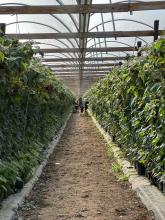In the beginning of September labour inspectors from Bulgaria participated in joint inspections in agriculture in the Kingdom of Belgium as a part of EMPACT days to combat human trafficking, which are held under Europol. The focus of the inspections was undeclared work, as well as working and accommodation conditions when are provided by the employer. Thе inspections were organized with the support of the European Labour Authority (ELA).
Representatives of National Social Security Institute also took part in the inspections. Belgian insurance inspectors also joined them together with labour inspectors. Three joint teams checked raspberry, strawberry and pear farms in the Limburg area, Belgium. According to Belgian data, about 40% of seasonal workers in the country are concentrated there, and the largest groups are Bulgarians and Romanians.
The daily employment of workers in the Kingdom of Belgium is the most commonly used way of providing labour for seasonal employment in agriculture. This method of employment is limited to 100 days per year per worker and is subject to registration. It is the employer’s duty to register the workers who will work at the beginning of each day.
During the checks the teams with Bulgarian observers visited farms on which Bulgarian workers were registered for the day, as they were established. In such cases, communication with workers directly in Bulgarian contributes not only to gathering information on working conditions and accommodation, but also to assist foreign labour inspectors in their control activities.
The participants in the inspections agreed that such joint actions are extremely useful for the exchange of experience and good practices and expressed their willingness to participate in other similar initiatives.
The General Labour Inspectorate took the opportunity to remind that the Bulgarian legislation also provides for a lighter procedure for the employment of labour for short-term seasonal agricultural work (Article 114a of the Labour Code). These oneday contracts are an opportunity for farmers who grow fruit, vegetables, roses, lavender and tobacco to legally employ workers under a simplified procedure for crop processing and harvesting. Such contracts shall be concluded with one worker for no more than 90 days in a calendar year and shall not be registered with the National Revenue Agency. Their duration is one day and farmers have no obligation to issue termination orders and to draw up labour books. It is important to note that in this type of contract, employees do not lose their right to social assistance and do not suspend their unemployment benefits. Thus, they receive additional income from work together with social benefits.


